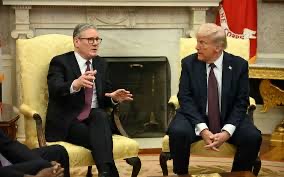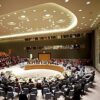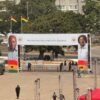President Donald Trump hosted British Prime Minister Keir Starmer at the White House Thursday to address the ongoing conflict in Ukraine and bilateral trade ties, amid the U.S. leader’s tariff threats on Europe and demands that the continent rely less on Washington for its security.
Ahead of their meeting, Trump was noncommittal on providing any security guarantees for Kyiv, including on a proposed U.S. “backstop” to support European peacekeepers to enforce a potential truce between Ukraine and Russia — a condition Starmer required.
“I hope we have that problem where we could worry about peacekeeping. We got to get there first,” Trump told reporters at the White House Wednesday. “Peacekeeping is very easy.
It’s making the deal that’s very tough.”
Differences remain among European allies on any future deployment of troops to Ukraine.
The U.K. supports a French-led proposal while other nations including Poland have ruled it out.
“I’m absolutely convinced that we need a lasting peace, not a ceasefire, and for that to happen, we need security guarantees,” Starmer said Wednesday, adding that Britain will do its part to support the measure as part of a Ukraine peace deal but only with a U.S. backstop.
Russian President Vladimir Putin rejects any suggestions of a peacekeeping troop deployment to Ukraine.
He said Thursday that “Western elites” are trying to disrupt the newly established dialogue between Moscow and Washington.
In recent weeks Trump has launched direct negotiations with Russia to swiftly end the war without the involvement of Kyiv or European allies, both of whom he has increasingly criticized. He has drastically reversed U.S. policies under his predecessor, former President Joe Biden, whose administration’s stance on the war was to “support Ukraine for as long as it takes,” and “nothing about Ukraine without Ukraine,” when it comes to peace negotiations.
Pushed to clarify Trump’s position on sending peacekeepers, a senior administration official speaking on background to reporters Thursday said that there are “concerns” about putting troops on the ground at a “post-Minsk I level of conflict, even post-Minsk II.”
The official was referring to the 2014 and 2015 agreement aimed at ending fighting between Ukraine and Russian-backed separatists in the Donbas region of eastern Ukraine, neither of which were sustained.
The official said there would be less concern to send troops if the conflict is “dialed down to a functional ceasefire,” as the U.S. wants, and even less with “a broad based, consensual peace settlement among the parties.”
The type of force deployed will depend on the political settlement to end the war, the official said — a “tradeoff” that Trump and Starmer will focus on.
A key message for Starmer to reinforce is that Europeans must be part of any peace discussions, said Gesine Weber, a fellow on the German Marshall Fund’s (GMF) Geostrategy team.
“Because it would be very odd to have a situation where you have the burden shift to Europeans, but not the strategic responsibility and the strategic reflections,” she said.




























